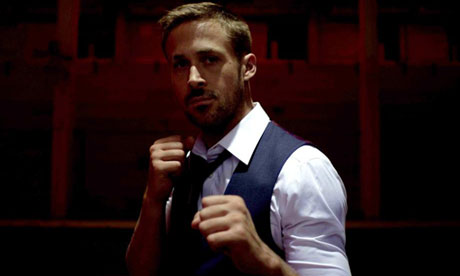Directed by Nicolas Winding Refn
Written by Nicolas Winding Refn
Denmark, France, Thailand, USA, and Sweden, 2013
Style oozes from every frame of Only God Forgives, tinged in red, like the blood that so frequently sprays across the screen and lands in artfully designed splatters. Writer-director Nicolas Winding Refn and star Ryan Gosling, reuniting after the cult success of 2011’s Drive, have collaborated on a truly baffling, bizarre, and gory crime drama that’s wall-to-wall striking, pretty images. Unlike Drive, however, Only God Forgives is hollow underneath all the model-like posturing and the flashes of excessive, gratuitous violence.
Gosling plays Julian, an American living in Thailand as a boxing promoter and drug dealer along with his sociopathic brother Billy. One night, Billy lets loose his nasty tendencies by raping and murdering an underage Thai prostitute; this act kicks off 90 minutes of various forms of outlandish vengeance from Julian, his fierce and forceful mother, and a rigid, overly moralistic Thai police officer. The plot is mostly a clothesline on which Refn hangs moment after moment of arresting, sometimes perversely beautiful violent tableaux, almost all of which are drenched in dark red. Even when blood isn’t spilling literally, it’s figuratively finding its way onto the faces of the people dragging themselves through this film.
At some point, roughly 30 minutes into Only God Forgives, it becomes painfully clear that many basic tenets of storytelling—character development, plot structure, story—will be eschewed in favor of technically proficient visuals. Refn and cinematographer Larry Smith come up with a number of haunting, unsettling shots, whether it’s Gosling slowly approaching an abyss-like doorway or of the Thai cop fending off attackers on the city streets at night. In fact, almost all of the technical elements of Only God Forgives are superlative, down to the Cliff Martinez score that does its best to be as chilling as anything Angelo Badalementi composed for one of David Lynch’s nightmare-fuel films like Mulholland Drive. As shiny and polished as Only God Forgives is, it never offers anything other than the most surface-level of pleasures; after a little while, that becomes something of a letdown.
Ryan Gosling is at peak Puppydog Criminal form in the film, letting his eyes emit rays of soulfulness and speaking so rarely that he might as well have given up on the dialogue altogether. (Even rarer within his spare lines of dialogue are words with more than one syllable, which becomes laughable by the film’s end.) And though Gosling has played the wounded antihero before, quite well in Drive and The Place Beyond the Pines, Julian is such a cipher of a lead character, so incredibly passive and more comfortable with inaction, that it’s very hard to latch onto any part of the performance. There are more than a few points in the first 30 minutes where it feels less like an authentic portrayal, and something closer to a parody of his work in past films.
Kristin Scott Thomas, as Julian’s profane, violent mother, comes off slightly better almost entirely because her role is flashier and more verbally colorful, what with hints that she may have dabbled in a wee bit of incest here and there. In one dinner scene, she calls to mind a younger, more gleefully psychopathic version of Lucille Bluth from Arrested Development, not even remotely trying to hide her disdain for Julian, her less successful son (in all possible, if not respectable, ways). As Lt. Chang, the police officer whose tactics go well beyond any laws in the Western world, Vithaya Pansringarm is most impressive, doing a great deal with very little. Chang always stands stock-still, hewing to an elaborate and insane moral code, but Pansringarm’s performance is as close to we get to a multi-dimensional character.
Drive is known partly because of its stylish imagery and Ryan Gosling’s mumbly, terse, yet somehow winning work onscreen. But Only God Forgives may prove that for Gosling and writer-director Nicolas Winding Refn, less of a script is not always more. Drive also had a sterling ensemble cast including Bryan Cranston, Ron Perlman, Carey Mulligan, and Albert Brooks. Though Thomas and Pansringarm do as much as they can to impress while Gosling mopes endlessly, there’s just not much here aside from potentially marveling at the artsy ways in which Refn depicts acts of horrific, unpleasant, and often disgusting acts of ultraviolence. Only God Forgives is a grim, nasty, fairly humorless film that barely comes alive, even when characters are being dispatched gruesomely, if handsomely.
— Josh Spiegel




